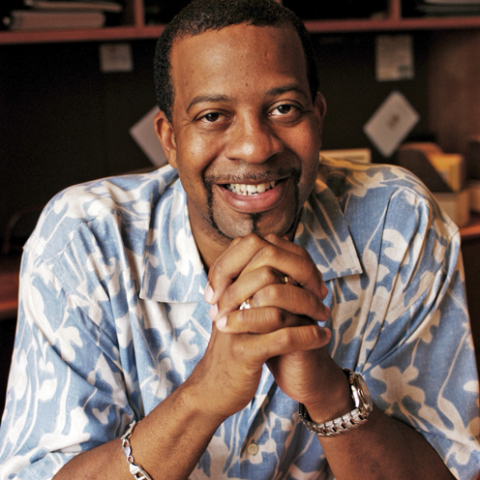Berklee Initiates Africana Studies and Music and Society Courses
For years Berklee has offered courses on jazz history and the history of rock, but beginning next spring, Berklee will begin to offer new and more comprehensive courses under the rubric of Africana studies/music and society. In July, the Professional Education Division and the Liberal Arts Department announced the appointment of Professor Dr. Bill Banfield who will oversee the development and teaching of these courses that give historical and social context for the evolution of contemporary American music.

Bill Banfield, Professor of Africana studies/music and society
Nick Balkin
“There is an opportunity to create something at Berklee that will be very different from the Africana or ethnic studies departments at other colleges,” says Banfield. “Africana studies departments elsewhere focus on the socioeconomic, political, and literary contributions of the African people. But with music as the foundation—the connective tissue if you will—these courses will be music-culture based and relevant to people of any background. Students who come to Berklee from Europe, Japan, or elsewhere to study rock, or hip-hop music will can as well get the full picture of what led up to this music.”
“This is not a niche area,” says Banfield. “Africana Studies is a global study of black music in the diaspora—the dispersion of African culture and peoples from Senegal to Cuba to Brazil to New Orleans to Jamaica, London, and Chicago. Its most ‘flowered’ extension is black American cultural traditions—meaning spirituals, ragtime, blues, jazz, gospel, r&b, and urban-music traditions. All American music styles are based on specific cultural models of those whose music grew out of a social need in their community. It’s about the good and bad in their land, trials and triumphs, a scream out against adversity. It’s powerful and gave people a sense of hope. That’s what makes it so different from other musical traditions.”
Lawrence McClellan, dean of the Professional Education Division, is enthusiastic about establishing the Africana studies program at Berklee. “I think Banfield will play a unique role here at Berklee by connecting the music and liberal-arts curricula,” McClellan says. “This will offer freshmen and sophomores who need liberal arts credits the option to earn them as they learn about the roots of contemporary music.” Africana studies courses will be three-credit courses among the required liberal arts courses, and can be substituted for such subjects as Western civilization.
Banfield served previously at the University of St. Thomas in Minnesota as endowed chair in humanities and fine arts, professor of music, director of American Cultural Studies, and as chair of jazz, American popular, and world music studies. He began his higher-education career at Indiana University, where he was an assistant professor of African-American studies and music, and the director of black popular music ensembles. Banfield serves as contributing editor for Scarecrow Press, African American Culture Studies, and is the Black Music Culture chair for the Popular Culture Association/American Cultural Association conferences. He holds a bachelor of music degree from New England Conservatory, a master’s in theology from Boston University, and a doctorate of musical arts from the University of Michigan.
A jazz and classical composer, Banfield has written nine symphonies as well as operas, and art songs. Nine recordings have been released featuring his work as a jazz composer/guitarist, including his latest AB2—Journeys for the Albany label. He has also authored two books.
Banfield hopes to ultimately see Africana studies offered as a major in Berklee’s Liberal Arts Department. “I’m excited about connecting with the faculty, students, and resources at Berklee,” he says. “Music has the power to change how people view things—that’s very significant. It’s not enough just to teach them that in the blues, you use these chords and scales. Students should understand the humanity of that music.”




